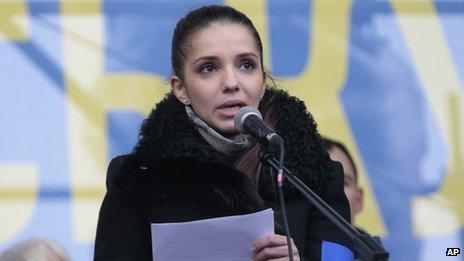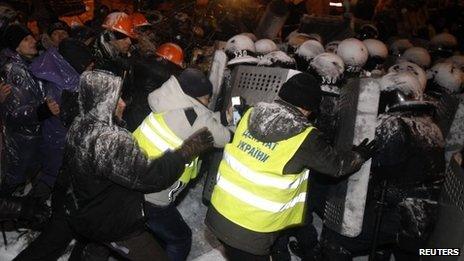The Yulia Tymoshenko contradiction
- Published
Watch Mark Urban's Newsnight film in full
Ukraine is in political crisis again.
Since its "Orange Revolution" nine years ago, pro-Western and pro-Russian groups have contended for political power. The current president, Viktor Yanukovych, stands accused by protesters of turning his back on Europe, after refusing to sign a partnership agreement with the EU.
They also accuse him of conducting a vendetta against former Prime Minister Yulia Tymoshenko, who was imprisoned more than two years ago for abuse of power.
Outside General Clinic No 5, in the Ukrainian city of Kharkiv, the incongruity of it all was striking.
The hospital, in which opposition leader Yulia Tymoshenko is held, is something out of Soviet times - an ugly, concrete monstrosity where security men in plain clothes patrol the grounds, keeping prying eyes away from a woman regarded by millions of supporters as a political prisoner.
Sitting in the hospital car park was a black Range Rover surrounded by bodyguards, and inside it we interviewed Mrs Tymoshenko's daughter Eugenia.
She was clad in designer black, she speaks English fluently after schooling and university education in the UK, and looks more like Natalie Portman about to step out on to a Hollywood red carpet than the average person's idea of a political dissident.
That is the Tymoshenko contradiction. Yulia Tymoshenko's imprisonment by the government of Mr Yanukovych causes European human rights groups to denounce him for persecuting a political opponent and turns her into an opposition idol.
Yet others claim the abuse of office conviction is just the tip of the iceberg and they allege that she lined her pockets while betraying the 2004 Orange Revolution in Ukraine.
When I asked her whether her mother was an honest woman, Eugenia argued: "Yanukovych spent millions on these audit companies and they all stated they couldn't find one penny of her corruption or abuse of power."

Eugenia Tymoshenko has kept her mother's plight in the spotlight
Back in the mid-1990s, when former state industries were being privatised in post-Soviet republics and there were fortunes to be made, Yulia Tymoshenko went into the gas business. The family says that's the origin of her wealth.
However Sergei Leshchenko, the deputy editor of Ukrainian Pravda, alleges that she entered parliament in 1996 to gain immunity from prosecution after allegations of financial irregularities.
As to the scale of the possible problems, he points to claims that Yulia Tymoshenko sent $100m (£60m) to former Ukrainian prime minister Pavlo Lazarenko, which emerged in a US court that convicted him of corruption charges in 2006.
When I asked her about the Lazarenko case, Eugenia Tymoshenko insisted that the American court had not indicted her mother or found her guilty of any offence.
"It's just something that pro-Yanukovych people use against her," she said, although Mr Leshchenko, who has written a book about the Lazarenko affair, is certainly no friend of the president.
Yulia Tymoshenko was convicted in a Ukrainian court, but in a process widely condemned by opposition groups as politically motivated.

Police and protesters have clashed in snowy central Kiev
What's striking though is that her supporters do not care about the mud-slinging and accusations. Eugenia's expensive clothes, bodyguards, and upmarket vehicles don't seem to bother them either. These are the everyday features of those who wield power and money in a post-Soviet republic.
When I asked Mr Leshchenko, who's extensively investigated official corruption in Ukraine, whether anyone has come through the country's recent upheavals with clean hands, he suggested it was possible since "not everyone wanted to be a billionaire".
Could Yulia Tymoshenko still become president one day? Mr Leshchenko thinks it's feasible given her "charisma", although he thinks it likely that a younger, less compromised figure will eventually come through. Eugenia said "I hope so" when I asked the same question.
The interview with her concluded, Eugenia and her bodyguards sped off into the swirling snow and I was left to contemplate the Tymoshenko phenomenon.
It's a measure of how broken and cynical politics in Ukraine has become that corruption allegations and a criminal conviction do not apparently put paid to someone's political career.
Many Ukrainians suggested to me that President Yanukovych's misdemeanours in office have been far worse than Yulia Tymoshenko's and indeed it is his behaviour, in imprisoning the former prime minister, that has revived her political fortunes.
You can watch Mark's report for Newsnight on the BBC iPlayer or via the Newsnight website.